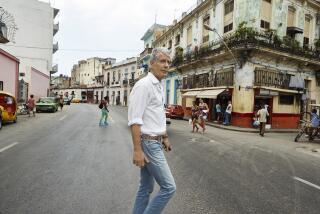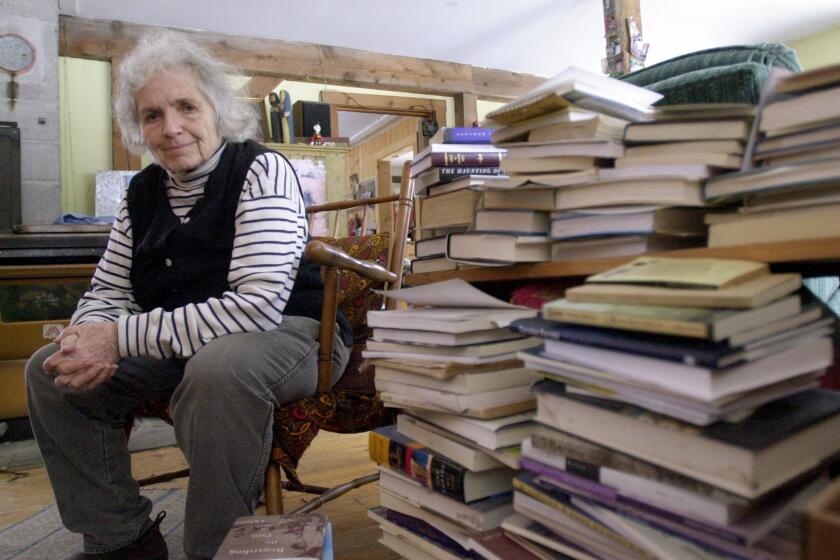Impolite society
THIS being December, consider some shopping advice:
If you loved Lynne Truss’ bestselling “Eats, Shoots & Leaves,” a joyous catnip wallow in other people’s ignorance of grammar, spelling and syntax, you might be disposed to order up her latest book in automatic multiples and make it your signature gift of the season.
Not ... so ... fast. It might be like giving a can of deodorant. Be prepared to do some fast ‘splainin’ to people who assume that the gift of a book titled “Talk to the Hand: The Utter Bloody Rudeness of the World Today, or Six Good Reasons to Stay Home and Bolt the Door” is meant to let them know that they’re insufferably rude, without you being rude enough to come straight out and say so.
Having enjoyed Truss’ arch, snippy, more-grammatical-than-thou romp through the tortures inflicted on our mangled language and the ways to avenge them, I settled in happily with her newest. I thought I would turn the pages, laugh and agree vehemently that we were on a GPS course to civilization’s end.
This book, like “Eats, Shoots & Leaves,” is about other people’s failings, but it left me uneasy and unsatisfied. For starters, Truss is almost apologetic about her premise, laying out the over-the-top title but then declaring that a book about a world full of boors is “a tad trivial” compared with one awash in war and famine.
Wrong. Stop. It is precisely the diurnal frictions of cool rudeness that make our lives intolerable -- far more than the rarer nightmares of war and famine, which can sometimes bring out our better angels in a way that no skateboarding brat or indifferent shopgirl ever could.
Nobody old enough to make it through a day without being tethered to an iPod can quarrel with Truss’ notion that the crowded world is insufferably moi-centered, that -- as Huey Long believed -- every man is a king. Yet that has made the rest of us as inconsequential as the empty Starbucks cup dropped on the sidewalk. We live, Truss wails with ample reason, in “an age of lazy moral relativism combined with aggressive social insolence.”
Truss doesn’t say so, but there’s something Darwinian about good manners being regarded as a sucker’s game. When I put on a turn signal, the driver of the car in the lane I mean to slide into doesn’t maintain his distance to help me -- he speeds up to keep me out. No wonder few people use turn signals anymore; that courtesy is now interpreted as a challenge to other drivers to keep you from moving in front of them.
One chapter, sagely titled “My Bubble, My Rules,” sums up the frustration: People act as if everyone else is invisible. The dispiriting truth of this book is that the line between public and private conduct has been trampled so often that it can hardly be said to exist anymore. The right to be left alone is different from acting as if we are alone, but who bothers about that? And in a world where human images can be switched off or channel-changed at will, we begin to act toward real people the way we do toward those on the TV or computer screen.
“Eats, Shoots & Leaves” is about a different subject, of course, and it would be unfair to expect Truss to write the same book twice. But the chief difference between the two is like the difference between tragedy and comedy. In grammar and spelling, there’s right and there’s wrong. In tragedy, everyone cries at the same thing. (Well, almost. Oscar Wilde said of the harrowing death of one Dickens heroine, “One must have a heart of stone to read the death of Little Nell without laughing.”) What is funny, be it Woody Allen or the Three Stooges, varies from person to person. So too are manners elastic and individual; one man’s rudeness is another’s standard operating procedure.
All of us could list personal “rants” as Truss does. I was hoping to read what to do about them all -- a comeuppance, a retort, some useful pointers about how to handle these little crises, without getting knifed or ignored. She does some wishful thinking on the page: She spots a teenage boy skateboarding through a shop and describes her “righteous urge to stick out a foot and send him somersaulting.” She also fantasizes about “pitching [cell]phones out of the window of a moving train.” But that gut-level imagined vengefulness is as far as it goes. She sometimes seems to be so afraid of offending, even in the name of good behavior, that she declaws her own points.
Truss spends a lot of time bewailing the failings of the service industry, whose workers seem determined to show there’s no “servile” in service. She quotes Barbara Ehrenreich, who wrote “Nickel and Dimed,” calling their behavior “aggressive hospitality.” It’s hearing the imperative “Have a nice day” (or else what?), instead of a simple “Thank you,” or having “Sorry” delivered in tones so sarcastic as to mean just the opposite.
Maybe that’s why much of our service industry has been outsourced to India; the people on the phones there are unfailingly patient and polite, but heck, they believe in reincarnation. They have all the time in the world.
One of Truss’ six reasons for staying home and bolting the door is a new phenomenon she calls “the Universal Eff-Off Reflex.” “If you point out to someone that he is in the wrong, you must be prepared for the consequences, which may include violence, but will automatically include Eff Off.” Warn a fellow shopper that her toddler is in danger as he climbs out of the shopping cart, and does she thank you? Hardly. Think of it as hostility poker: The other guy will see you and raise you one middle finger.
“Talk to the Hand” is a book that should have been shorter and funnier -- or longer and more serious. Either way, Sartre said it all more efficiently, and more desolately: Hell is other people. *
More to Read
Sign up for our Book Club newsletter
Get the latest news, events and more from the Los Angeles Times Book Club, and help us get L.A. reading and talking.
You may occasionally receive promotional content from the Los Angeles Times.





